It is with much gratitude and admiration that we celebrate the jury alumni members of the Core77 Design Awards.
- All Categories
- A/V & Photography Equipment
- Apps & Platforms
- Branding & Identity
- Built Environment
- Commercial Equipment
- Consumer Product
- Consumer Technology
- Crowdfunding
- Design Concept
- Design Education Initiative
- Design for Social Impact
- Emerging Technologies
- Furniture & Lighting
- Gaming Accessories
- Health & Wellness
- Home & Living
- Interaction
- Lifestyle Accessories
- Open Design
- Packaging
- Personal Accessory
- Robotics
- Service Design
- Speculative Concept
- Speculative Design
- Sports & Outdoors
- Sports & Recreation
- Strategy & Research
- Sustainability
- Tools
- Tools & Work
- Toys & Play
- Transportation
- Visual Communication
Jury Alumni

Gill Wildman
Co-Founder and Director, Plot Studio
2015 Design for Social Impact Jury Member
Gill has pioneered the use of design in strategy and innovation for 20 years. She was educated as a designer at Manchester Metropolitan University; has an MA in Design Innovation and Strategy from Brunel University; and recently held Carnegie Mellon School of Design's Nierenberg Chair for 2 years.Her early career was as a researcher and developer of public services in play, youth and social action contexts. This used a people-centered practice of connecting local needs, networks and agencies called the community development approach.She created the design strategy agency Plot in 2004 after four years as a Design Manager at the UK Design Council. Plot has provided innovation labs, workshops and consultancy for a wide variety of public, private and third sector clients at different stages of their lifecycle.Right now, Gill's attention is focused on Upstarter the nomadic design-led incubator she has founded. It's mission is to stimulate embryonic enterprises using strategic design thinking, innovation and design methods. The Upstarter programme is active with partners in London, Bristol and Barcelona, and helps bring a mix of social, commercial and creative industry startups to life.
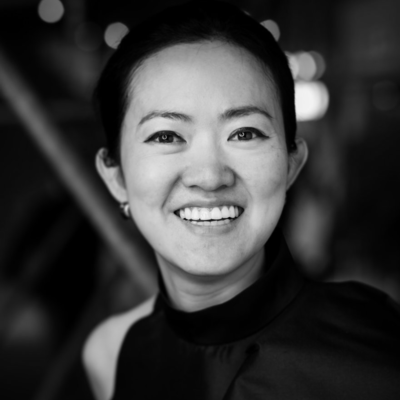
Kotchakorn Voraakhom
Founder and CEO, Porous City Network
2020 Design for Social Impact Jury Member
Kotchakorn Voraakhom is a landscape architect from Thailand who works on building productive green public spaces that tackle climate change in urban dense areas and vulnerable communities. She created the first critical green infrastructure for Bangkok, the Chulalongkorn Centenary Park, and is currently planning the opening of a 36-acre urban farm rooftop featuring the biggest urban farming green roof in Asia.
Voraakhom was featured in the 2019 “TIME 100 Next” list as one of 15 leading women fighting against climate change and the “Green 30 for 2020” by Bloomberg. She is Chairwoman on the Landscape Architects Without Borders working group of the International Federation of Landscape Architects, Asia Pacific Region (IFLA APR).
Voraakhom received her Master's in landscape architecture from Harvard University's Graduate School of Design. Currently she is also a TED Fellow and an Echoing Green Fellow.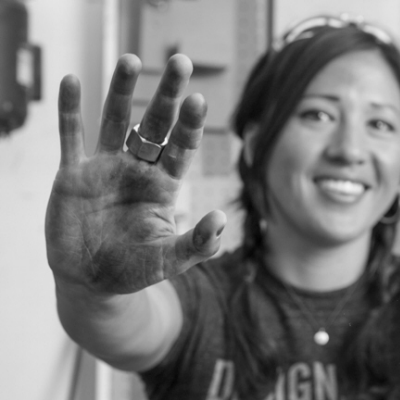
Emily Pilloton
Founder, Project H
2016 Design for Social Impact Jury Captain
Emily Pilloton is the founder of the nonprofit Project H Design. Since 2008, she has run Project H and worked with young people ages 9-18 to bring the power of design and building to schools and communities. Emily is trained as an architect with degrees from UC Berkeley and the School of the Art Institute of Chicago, but found that she is physically incapable of working in an office or for a boss and much prefers the creative chaos of a public school classroom filled with tools and welding equipment. Project H Design was born out of the hope that authentic, on-the-ground, face-to-face work with young people could transform what it means to be a design professional, what it means to learn in the 21st century, and what it means to get dirty and physically build solutions for your community.
Specifically, Emily launched 2 Project H programs: Studio H, an in-school design/build curriculum, and Camp H, an after-school and summer building camp for young girls ages 9-13. Exploring the intersection of science, art, math, and community development, Emily has led Project H youth in the design and construction of an award-winning 2,000-square-foot farmers market structure, chicken coops, playgrounds, their own school library, microhomes for the homeless, laser-etched skateboards, and welded steel public sculpture.
Emily believes that by giving youth, particularly girls and students of color, the skills to design and build their wildest ideas, we can support the next generation of creative, confident changemakers. Her ideas and work have made their way to the TED Stage, The Colbert Report, the New York Times, and more. Her work is the subject of the full-length documentary If You Build It. She is the author of two books, Design Revolution: 100 Products that Empower People, and Tell Them I Built This: Transforming Schools, Communities, and Lives with Design-Based Education. Emily is also a Visiting Professor in the Department of Design at UC Davis.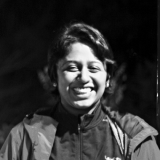
Babitha George
Partner, Quicksand
2015 Design for Social Impact Jury Member
Babitha George is a Partner at Quicksand and leads multiple innovation projects within Quicksand. Her prior work in education in India prompted her to actively think about the role of design thinking in social impact contexts, leading her to steer several of Quicksand's social innovation projects, especially in the use of technology in education and vocational training contexts, to improve learning outcomes and create more engaging & transformational learning environments. She is a management graduate from IIM Ahmedabad, prior to which she studied English, Journalism & Psychology and with this background, Babitha believes strongly in the strength of multi-disciplinary approaches. Her core skills are in design strategy and research as it pertains to conceptualizing products and services that promote sustainability and quality of life, especially for low income communities.Babitha is one of the co-founders of the UnBox Festival. She is also on the Advisory Board of the Victor Papanek Foundation and was recently featured in the British Council's 'Blurring the Lines' exhibition in London, as one of sixteen people from around the world who are reinventing creative exploration and participation in their respective communities.
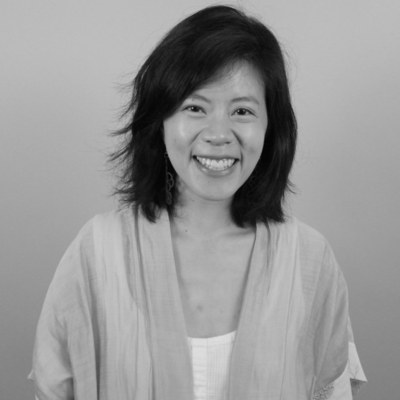
Rebecca Hui
Founder, Roots Studio
2020 Design for Social Impact Jury Captain
Rebecca is a designer and social entrepreneur who has spent nearly a decade elevating the brilliance of overlooked artists to the global limelight. She started Roots Studio, which digitizes indigenous art into an online library for licensing into fashion and home, with returns of 5 - 20x the status quo price. Her work has ranged from turning heritage tattoos into animations, to producing thousands of notebooks from a scroll painting tradition with fewer than 7 artists left. She has been recognized as a Forbes 30 Under 30 Social Entrepreneur, Echoing Green Fellow, a US Department of State Innovation Delegate, and an Unreasonable Group Fellow. Her work has been written in PBS, TechCrunch, WGSN, MIT Technology Review, and Stanford Social Innovation Review. Rebecca also advises on cultural restoration for post disaster regions and mapping technology with the World Bank and the United Nations. She started her journey as a Fulbright Scholar and National Geographic Explorer on the project, "The Secret Life of Urban Animals".
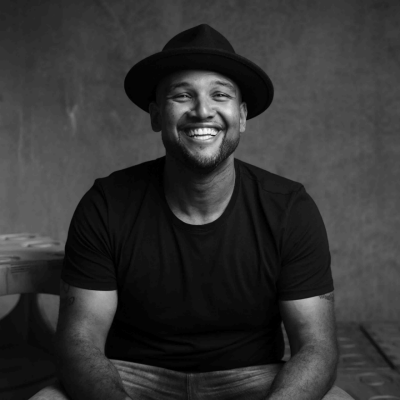
Jason Mayden
CEO + Co-Founder, Super Heroic Inc.
2017 Design for Social Impact Jury Member
In his previous role at Nike, Jason oversaw the design and execution of all conceptual products, data driven innovations and inline lifestyle and performance product for Jordan Brand, as the Senior Global Design Director. During his 13+ year career at Nike, Mayden led and contributed to the creation of innovative sport performances products for athletes and cultural icons such as Carmelo Anthony, Chris Paul, Russell Westbrook, Derek Jeter, and Michael Jordan.
In 2011, Mayden successfully received his Master’s in General Management and Social Innovation from Stanford University’s Graduate School of Business and shortly there after he returned to Nike as the Global Director of Innovation for Nike Digital Sport where he was responsible for the strategic investigation of
new technologies and services, such as the Nike Fuel Band.
He is now at Accel assisting with the continuous development of Accel’s brand position amongst the global community of entrepreneurs while working with portfolio companies on deepening and extending their knowledge and ability to create cultures of curiosity. Moreover, he is also an advisor of Slyce, a company created by fellow Nike alum Bryant Barr and NBA Superstar Stephen Curry, a platform focused on creating a new paradigm at the intersection of campaign workflow planning and brand-to-influencer content management. Lastly, is the CEO and Co-Founder of Super Heroic a business focused on provided quality play-performance footwear, apparel and technology for elementary school aged children.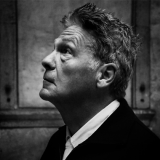
John Thackara
Director, The Doors of Perception
2015 Design for Social Impact Jury Captain
For thirty years, John Thackara has traveled the world in his search of stories about the practical steps taken by communities to realize a sustainable future. He writes about these stories online and in books; he uses them in talks for cities and business; he also organizes festivals and events that bring the subjects of these stories together.John is the author of a widely-read blog atdesignobserver.comand of the best-sellingIn the Bubble: Designing In A Complex World (MIT Press) û also translated into nine languages. As director ofdoorsofperception.com, John organizes conferences and festivals in which social innovators share knowledge.John is a Senior Fellow of the Royal College of Art, in London, and a Fellow of The Young Foundation, the UK's social enterprise incubator. He sits on the advisory boards of the Pixelache Festival in Helsinki, the Future Perfect festival in Sweden, and Design Impact in India. He is also a member of the UK Parliament's Standing Commission on Design.Earlier, John edited the magazine Design for five years, and was later Modern Culture Editor of Harpers & Queen, and design correspondent of The Guardian. He then started a conference and exhibition company ,with offices in London and Tokyo, which created and organised events at the Pompidou Centre, Victoria & Albert Museum, Axis Gallery in Tokyo, and other venues. From 1989-1992, John was Director of Research at the Royal College of Art.Among John's 12 books are Design After Modernism: Beyond the Object (1987) andLost in Space: A Traveller's tale (1995). He has lectured in more than forty countries.

Daanish Masood
Innovation, Dept of Political and Peacebuilding Affairs, United Nations
2020 Design for Social Impact Jury Member
Daanish Masood Alavi is an investigator at BeAnotherLab, a transnational interdisciplinary group that uses art, science, and technology to promote empathy and perspective taking among diverse communities; thereby facilitating shared civic action across identity fault lines. The group uses virtual reality and techniques derived from cognitive science research in developing critical applications in art, scientific research, social projects, healthcare and education, putting a strong emphasis on the impact of the work in people’s lives. BeAnotherLab’s work is based on an inclusive and distributed model of action-research and collaborative design. From 2014-2015, Daanish was a research affiliate at MIT’s Arts, Culture, and Technology program, which enlists science and technology in cultural production, critique, and dissemination at the civic scale.
Daanish also serves at the United Nation’s Department of Political and Peacebuilding Affairs, where he co-leads the Innovation Team, which focuses on collaboratively using human centered design, new tools and technology (AI and Machine Learning, satellite imagery, XR) to meet on-the-ground needs of UN peacemakers.
Noopur Agarwal
Associate Professor + Program Director, Design, University of San Francisco
2024 Design for Social Impact Jury Member
Noopur Agarwal is a visual communication designer and educator dedicated to increasing critical public engagement with issues of global and local concern. Her practice is based both on service: working collaboratively and interdisciplinarily to make a strategic difference within an organization; and authorship: producing exploratory works. Her creative output often takes the form of “experiential graphic design” (physical and digital interactive environmental graphics) and includes brand identity concepts for events, organizations, exhibitions, publications, and advertisements.
Agarwal is currently is an Associate Professor and Design Program Director in the Art + Architecture department at the University of San Francisco. She maintains an active consultancy practice in addition to her teaching, where her client list has included nonprofit, publishing, and technology organizations.